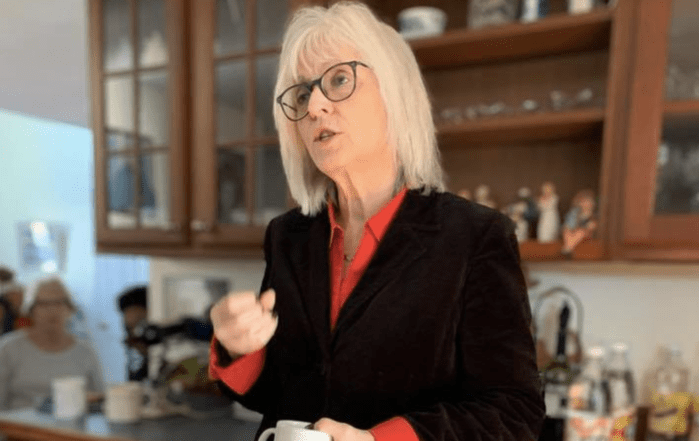
Dems now hold 128 of 160 seats in the House. “Two areas that were strong for Trump a few years ago came back home and voted blue.”
There’s never even a remote chance of Republicans doing well enough in state elections to dominate the Massachusetts legislature. Nevertheless, even for a member of the GOP like Governor Charlie Baker, who has friends on both sides of the aisle, it’s nice to have some allies in the State House.
But as Bay Staters cast votes during the coronavirus pandemic, any such hopes were extinguished for Baker. As the world slouched toward normalcy, then became engulfed in nationwide protests over the killing of George Floyd by a police officer in Minneapolis, the Commonwealth held several special elections for seats in the legislature, two of which impact seats held by outgoing Senate Republicans.
In total, there were four elections over a two-week span: two for state Senate seats, and two House seats. Democrats won big in every race, including for two senate seats in traditionally Republican districts that have trended left in recent years.
The results have little to no impact on the balance of power on Beacon Hill, but point to a larger shift away from the GOP among Mass voters, even in areas where Republicans have a history of success. And Dems didn’t hesitate to tout the national ramifications.
“Tonight was a bad night for Donald Trump,” Massachusetts Democratic Party Chairman Gus Bickford said after the special elections held last month. “Two areas that were strong for Donald Trump a few years ago came back home and voted blue tonight.”
Democrats now hold an overwhelming 36-4 advantage in the Senate, their largest majority since 2014. The special senate elections were the first in Mass since the coronavirus lockdowns took effect. Both had originally been slated for late March.
In the Plymouth and Barnstable District, which stretches as north as Pembroke and as far southeast as Sandwich, Falmouth selectwoman Susan Moran beat attorney and 2018 GOP nominee for Attorney General James McMahon.
The race was to replace Republican Vinny deMacedo, who had won reelection by a healthy 17-point margin as recently as 2018, a year Democratic energy swelled nationwide.
Moran ran a standard Democratic campaign, calling for investment in infrastructure, education, and healthcare and advocating for renewable energy and coastal aid.
McMahon, who stood in staunch contrast to the progressive Attorney General Maura Healey as a hard-right law and order candidate in the 2018 AG’s race, used his conservative cred to whip up enthusiasm around his candidacy.
“I don’t know what type of polling information liberals are getting, but people hate that we are pandering to illegals and giving them licenses,” McMahon told the Cape Cod Times before the May 19 election.
McMahon tied himself closely to the anti-lockdown movement, and beat a well-funded, establishment-aligned Republican in the March 3 primary.
In the last full month before the election, Moran was outraised by nearly four to one by McMahon, but a cascade of endorsements from well-known pols like Ed Markey, Maura Healey, Bill Keating, and Joe Kennedy boosted her candidacy. In the end, Moran won by about 15 points—or 2,100 votes. The district went 50-48 for Obama in 2012, and 49-44 for Clinton in 2016.
Given that the special elections—which rarely garner the attention of midterms and general elections—were held during the coronavirus pandemic, turnout was predictably low in both contests.
“When you look at the smart, really careful decisions that folks have been making about their personal health and social distancing,” Moran told WCAI last month, “along with the incredible challenge of this very first election during COVID, I think that the numbers being lower really were indicative of the impact of corona, the fact that this is a special election, early voting, you know, real challenges.”
To the west, in the 2nd Hampden and Hampshire District, moderate Dem state Rep. John Velis beat business owner John Cain with about 64% of the vote. The special election was called when Donald F. Humason resigned to become mayor of Westfield. It is the first time in 25 years that the district, which spans from Holyoke to Tolland, will be represented by a Democrat. While turnout was only about 15%, Velis’ margin of victory represents a 48-point swing from the last time the district had a competitive election in 2016.
“Historically, the opposition party has shone in lower-turnout special elections, so these twin defeats are especially devastating,” the conservative Lowell Sun editorial board wrote following the senate losses.
While moderate Republican Charlie Baker remains very popular among Bay Staters, the state party has pushed harder to the right in recent years. Both senate candidates are ardent Trump backers, and have advocated for a much quicker reopening than Baker’s plan. In 2016, Trump lost Massachusetts by 27 points.
“We are disappointed,” Mass GOP Chairman Jim Lyons tweeted after the senate losses. “The radical Democrats are committed to fundamentally change our country. We are committed to Keep America Great.”
Two weeks later, Republicans sought to hold another seat: this time the 3rd Bristol state rep district, which covers parts of Easton and Taunton. Again, they failed.
The seat was vacated when Shaunna O’Connell stepped down after being elected mayor of Taunton. The district had been in GOP hands for nearly a decade before O’Connell resigned, eventually setting up a showdown between Democrat Carol Doherty and Republican Kelly Dooner. Doherty is a Taunton School Committee member who served as president of the Massachusetts Teachers Association. Dooner serves on the Massachusetts Young Republicans executive board.
On election day, Doherty won with 57% of the vote, more than a 30-point swing from O’Connell’s last victory in 2018.
In the 37th Middlesex, a central Mass district stretching from Lunenburg to Acton, Dems were defending a seat vacated by Jennifer Benson.

Democrat Danillo Sena beat Republican Cathy Clark in the district’s first competitive election in 10 years. While the other three special election victors represent the traditional/moderate brand of Massachusetts Democrats, Sena’s progressive platform represents the party’s move to the left since 2016.
A Dreamer from Brazil who worked as district director for leading progressive state Sen. Jamie Eldridge, Sena campaigned on left-leaning policies like Medicare For All, same day voter registration, and 100% renewable energy. He won with 74% of the vote.
Dems now hold 128 of 160 seats in the Massachusetts House of Representatives.
The special elections yielded a welcome result for Democrats, who have taken recent hits nationally. Last month, the party lost a high-profile US House seat in California and failed to flip another in Wisconsin.
“As long as the core message of the Massachusetts GOP is to spout hate and inspire division, voters will reject them as they did today and as they did two weeks ago when they lost one-third of their seats in the State Senate,” Bickford said.
Patrick Cochran is an independent journalist covering politics and grassroots activism.

